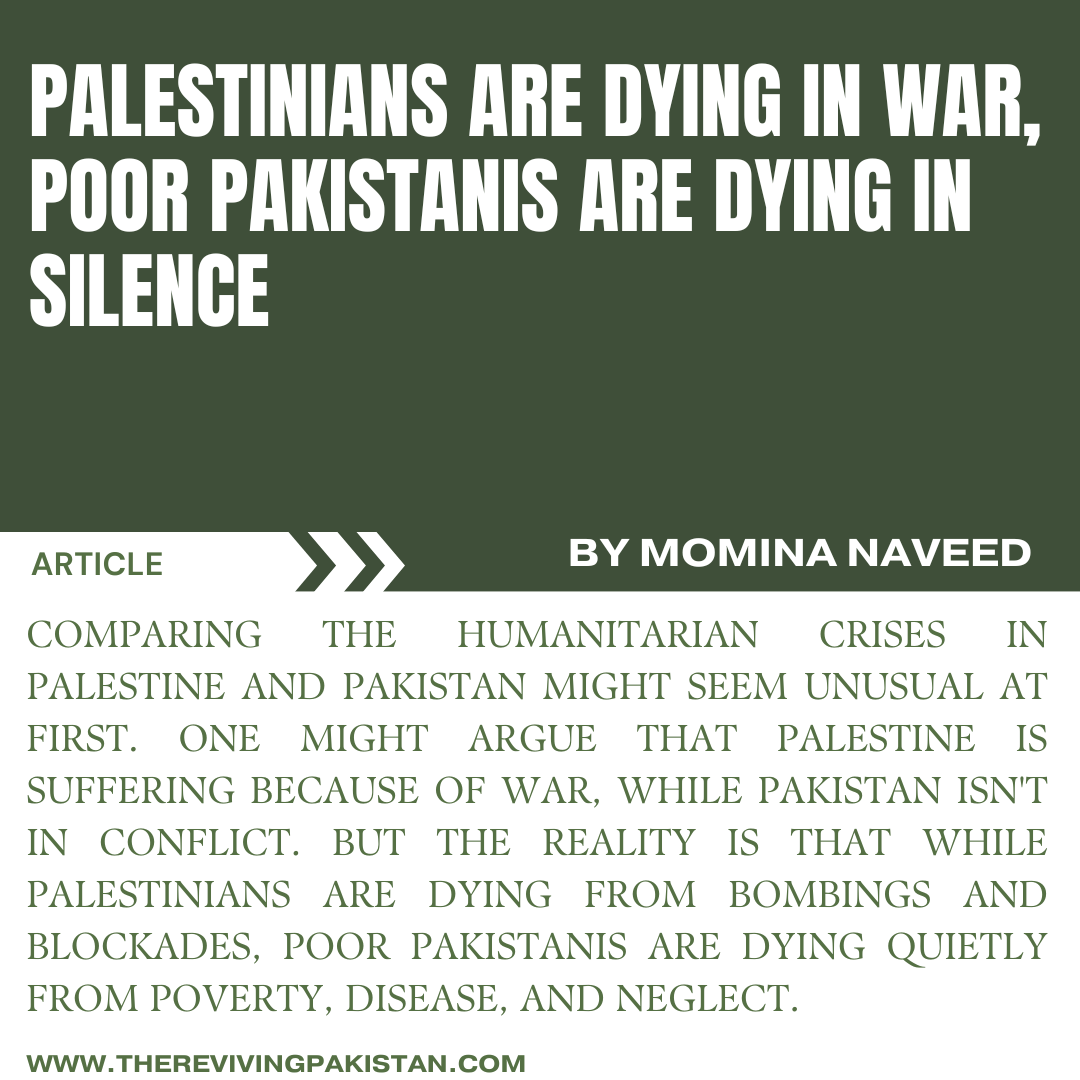About the Author(s)
Momina Naveed is a graduate of Shaheed Benazir Bhutto Women’s University in Peshawar. She has a passion for writing that aims to raise awareness and amplify the voices of vulnerable and marginalized communities. Through her work, she seeks to bring attention to issues that are often overlooked and to create a platform for change.
Comparing the humanitarian crises in Palestine and Pakistan might seem unusual at first. One might argue that Palestine is suffering because of war, while Pakistan isn’t in conflict. But the reality is that while Palestinians are dying from bombings and blockades, poor Pakistanis are dying quietly from poverty, disease, and neglect. Both populations face dire humanitarian situations, though in different contexts. The suffering of the poor in Pakistan, though not caused by war, is just as life-threatening as what is happening in Gaza. If Palestinians are suffering from a lack of necessities like food, medicine, energy, healthcare, and shelter, so are poor Pakistanis. If Palestinians are dying from infectious diseases and starvation, poor Pakistanis are facing the same fate.
In Pakistan, nearly 20,000 people commit suicide annually, mainly due to joblessness and poverty. The numbers would be much higher if it weren’t for the religious and social stigma associated with suicide. Besides suicide, many die due to malnutrition, health crises, and psychological stress.
The reasons behind these deaths and the rising poverty rate in Pakistan include political and economic instability, lack of human development, mismanagement of natural disasters, and militant attacks.
Poor Pakistanis are suffering every second, feeling as if they’re dying from the inside while remaining alive on the outside. With financial resources dwindling and unemployment adding to their psychological stress, many endure a silent, invisible crisis that leaves them struggling to survive each day.
When Israel launched attacks on Gaza after Hamas’s attack on October 7, 2023, almost the entire population of Gaza was forced to flee their homes and live in refugee camps. Similarly, during the floods of 2022, Pakistan witnessed the internal displacement of 33 million people, making it the world’s largest disaster displacement event in a decade. Even after two years, many flood survivors still live in camps because they can’t afford housing. Additionally, those displaced from ex-FATA due to anti-militant operations are also stuck in camps, with no way out. Won’t they die from a lack of resources there?
As we know electricity in the camps is almost non-existent. Palestinians, since the start of the war, have been without electricity or gas supplies. The same situation is mirrored in Pakistan. But even outside these camps, in urban slums or remote villages, Pakistanis have been enduring severe power shortages for the past two years. Those in poorer areas, who cannot afford solar systems or gas cylinders, are left vulnerable to extreme weather conditions. Won’t they too face death due to starvation or exposure to heat and cold?
Due to the war, Palestinians have been forced to abandon their education. In Pakistan, the poor are forced to forgo education not because of war, but because of a lack of resources and funding. Reports on the number of out-of-school children in Pakistan suggest that most of these children come from the poorest segments of society. What future awaits these children when they grow up without an education? They might even consider suicide when they realize their lack of prospects. And even those who do manage to get educated still face the bleak reality of unemployment.
Palestinians are dying due to a lack of food. But what about the Pakistanis in such camps? Both Palestinians and displaced Pakistanis are dependent on international food organizations. While it’s understandable for Palestinians, who lack a functioning government, why can’t Pakistan’s government or its elite step in to support its people? Instead, ordinary Pakistanis are forced to cut back on meals due to soaring food prices and high taxes.
We have seen videos of Palestinians dying in hospitals due to a lack of medical supplies. In Gaza, hospitals are barely functional, leading to deaths from untreated wounds or illnesses. Meanwhile, Pakistan has established hospitals to provide free healthcare for the poor, but are they enough? The overwhelming crowd in these hospitals speaks otherwise. Moreover, the high cost of medicines forces many to cut spending on other essentials just to survive.
Palestinians are paying with their lives for crimes they did not commit. Poor Pakistanis are paying with both their lives and their finances for resources they barely get to use. They pay high energy bills for only a few hours of electricity each day. Pakistanis pay high food prices that barely fill their stomachs. They pay for education that doesn’t secure them jobs. And they pay for medical treatment that only offers a reprieve from death.
Since October 7, 2023, both state and international media have been focused on the suffering in Gaza, which needs attention. But at the same time, the humanitarian crisis in Pakistan seems to be overlooked. The voices trying to highlight the dire conditions of the poor in Pakistan are not being heard by those in power. It’s time for us to speak up for them too. If international organizations like UNICEF, WHO, and the World Bank can step in to help Palestinians and displaced and vulnerable Pakistanis, why are we not doing more to support our people? If you can’t offer financial help, you can still contribute by creating opportunities or simply raising awareness.
While I stand in solidarity with the Palestinian people and fully support efforts to alleviate their suffering, I also urge the world not to forget the poor in Pakistan and other developing countries. They, too, are enduring similar struggles—though in different circumstances. Their plight should not be overlooked, and our attention and resources must be shared to address both crises.

